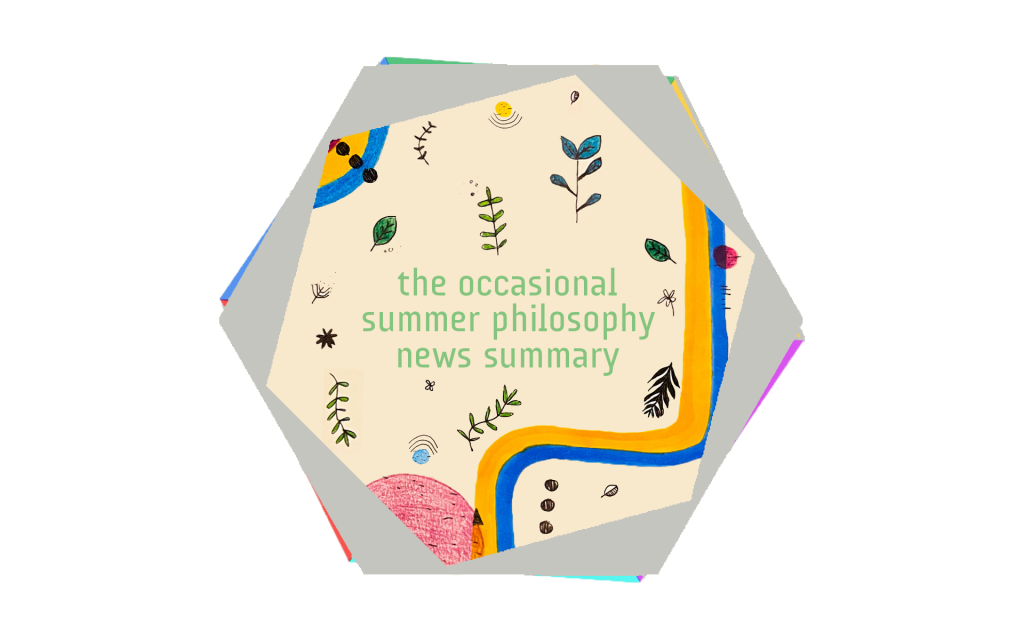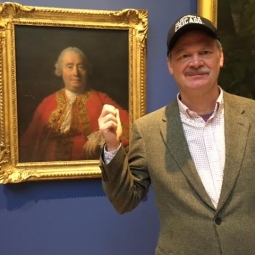“We shouldn’t attempt to fit ‘outreach’ or ‘engagement’ into one of the existing three categories [of research, teaching, or service]. It doesn’t fit neatly into those categories. And, more importantly, all of us should be doing it as part of our jobs, not just a few of us. We are in an all-hands-on-deck situation.”
In the following guest post, Alex Guerrero, professor of philosophy at Rutgers University, argues that we should count engagement or outreach as a distinct component of the job of professor.
This is the fifth in a series of weekly guest posts by different authors at Daily Nous this summer.
[Posts in the summer guest series will remain pinned to the top of the page for the week in which they’re published.]

[“The Beautiful Walk” by René Magritte]
The job of a philosopher in America has been defined in relatively specific terms. These are the terms: research, teaching, and service. How much of one’s life one is expected to contribute to each, the precise percentage and weight, varies from job to job. In some, research is all that matters. In others, teaching is the thing. More rarely, a philosopher wanders deep into administration, lost in a forest of service, and emerges as a thoughtful if pesky manager and builder of things with varying degrees of value. For most of us, we are required to do all of these, more or less well, with more or less joy.
Socrates and Kongzi both might have, for once, been at a loss for words if forced to say whether they were doing research, teaching, or service. But we have contracts, faculty handbooks, promotion guidelines, and legalistic specifications of what we are required to do. None of us are employed as philosophers. We are employed as professors (lecturers, instructors). For the most part, our job is like that of other humanities professors, and unlike that of research scientists and others in STEM fields supported by grants, who do things like “buy out” of teaching and oversee research labs. For us, the job is the core three: research, teaching, and service.
Teaching is the very official role where we are in front of enrolled students, in a class that counts for credit, presenting material, devising and evaluating assignments, and figuring out ways for students to learn what we take to be important about the subject. Our teaching responsibilities are almost always defined by the number of courses taught per academic year, spread out over semesters or quarters, often specified in terms of level and number.
Research is publication. We might wish it were instead about ideas, figuring new things out, moving knowledge forward—regardless of whether that results in articles in peer-reviewed journals or books in academic presses. But we know better. You need 8 publications for tenure in B+ or better peer-reviewed journals. Or 1.5 per year on the tenure clock. Or whatever. What “counts” for research, and how much it counts, is usually clear, even if promotion requirements are rarely specified in detail. Post-tenure, although research productivity factors into further promotions and merit raises, the sense in which it is “required” becomes considerably murkier.
Service is what is required to keep up the pretense that universities and colleges are run by the faculty, rather than by a distinct managerial class. We “serve” on hiring committees, as undergraduate and graduate program administrators, on curriculum committees, on admissions committees, in organizing colloquia and events, in putting people forward and evaluating them for tenure and promotion, as chairs and vice-chairs, deans and deanlets, and on committees for every domain of human complaint and frustration—these are the core of internal, university service. We serve our departments, schools, colleges, and universities. Many of us expand beyond this to engage in service to the “profession”—running academic journals, professional associations, planning workshops and conferences, creating and supporting broad mentoring and inclusion efforts, and so on.
Most of us were just dropped into this world of research, teaching, and service. I’ve never seen anyone try to justify why these are the three parts of the job. As many have noted, they don’t fit together all that naturally. What makes one an amazing teacher might have nothing do with what makes for a groundbreaking researcher. And we almost expect that whatever makes us good at those things will make us inept at, or at least impatient with, most kinds of “service.” Our graduate training programs do very little to train us to teach, or to administer anything or manage anyone.
The explanation for the three branches seems to be a historically contingent one, with the modern college or university coming to exist with a dual-purpose mission of educating students (teaching) and advancing knowledge (research), and service comes along as a third thing essential to preserving various values relating to those first two. Specifically, the values of academic, expert peer review (for admissions, hiring, publication, research evaluation, promotion) and academic, expert curriculum and course design and implementation.
There are, of course, many ways of rethinking this basic three branch setup, and many institutions that have already reconfigured things so that people are hired into jobs where they will do just one or two of those three things. I don’t want to wade more deeply into those waters. Instead, I want to suggest that, given the pressures confronting colleges and universities, sustaining those institutions in their core dual-purpose mission of educating students and advancing knowledge requires introducing a fourth branch. I’m not sure what name for that fourth branch is best. Here are my two favorite candidates: outreach and engagement.
The basic argument for the fourth branch is simple.
Colleges and universities are supported (1) by the general public, through government funding; (2) by students and their families, through tuition and fees; and (3) by rich people, through donations. What education and what knowledge will be pursued in colleges and universities is not set in stone; it is, rather, a function of what those three groups want and demand. If we want philosophy to be part of the education and part of the knowledge that is pursued in the years to come, we need people in those three groups to want and demand philosophy. And for people in those three groups to want and demand philosophy, we need to reach out to them, engage them, make them aware of what philosophy is and why it is wonderful and valuable. Given what philosophy is, and given our contemporary situation, that task is monumental, and must be undertaken at many different levels, in many ways. No small number of us can do it on our own. Therefore, it should be a part of all of our jobs—quite literally—to do this work.
(We can substitute in almost any humanistic field for ‘philosophy’ in the above argument, with similar implications for a needed fourth branch for the rest of the humanistic fields.)
The basics of this ‘demand side’ story are familiar. Many students and parents think of college and university in terms of relatively short term, career ambitions—how will this major, this degree, this school help me get a job. Many states and nations have begun taking a similar attitude toward all higher education, thinking in terms of contribution to economic productivity. Little actual empirical investigation is involved in deciding that humanistic fields, and fields such as philosophy, in particular, don’t do well by this score. But that is a common public perception. And it is understandable. It seems plausible that a degree in business, health professions, computer science, engineering, or biomedical sciences (the five largest growth majors over the past ten years) would be a more direct route to a job than a degree in English, history, or philosophy (three of the majors that lost the most majors over the past ten years).
There are other factors that affect demand. STEM fields are intimately connected to industries and occupations outside of the academy, so that one might have encountered a person with background in that field. We no longer have the same kind of elite, quasi-aristocratic veneration of those humanistic things that every “educated” person must know. STEM spends more time in the news, as breakthroughs in tech, science, and computing get regular reporting and discussion, and result in products in our pockets and dreams on our screens. In the United States, quality exposure to literature, philosophy, and even history is rare prior to college or university, with many students not having encountered any philosophy before college, and having encountered history only as rote memorization and literature only as forced reading.
Behind the idea that colleges and universities have a dual-purpose mission of educating students and advancing knowledge is a mostly implicit idea about what education and knowledge is valuable and why. For those of us working as professors in a subject domain, we almost certainly see the domain as valuable, and can offer many different compelling reasons why it is valuable, pointing both to intrinsic or final value of the subject, and to instrumental benefits of education and knowledge in the domain. We can go on and on about personal transformation, what it means to be human, learning to think critically about what is important, becoming a democratic and cosmopolitan citizen of the world, and so forth. But for those not already in philosophy, where are they supposed to hear the good news?
It is easy to vilify the administrator class, focused on the bottom line—bottoms in seats, donations to “development” offices, legislative support for public institutions. But it is not their fault that higher education is funded as it is. It is not their fault that we, the professoriate, don’t have unbridled power to force people to study those subjects that we see as most valuable. Professors like the idea of being in control: we get to design the curriculum, plan the syllabus, pick the readings, develop the research projects, evaluate the work, decide what should be published, determine who should be admitted, hired, promoted, esteemed. This all seems right and good to us, given our knowledge and expertise. But that is not the system we have with respect to the very basic facts of higher education in most contemporary political environments. We might wish for administrators who could hold the line, fight the battle for us, make the case for the importance of philosophy and the humanities. And some of them can and do. But many operate in incredibly difficult economic and political environments. They can’t change the basic facts about whose demand matters. And they can’t even do much to affect the substance of what is in demand. They need help. And—at least given our knowledge—we are well positioned to provide it.
Many of us are already involved in various efforts to broaden exposure to and engagement with philosophy. Most involved in this work aren’t doing it thinking to “increase demand” for philosophy, but it plausibly has that effect. There are obviously central enterprises: exposing children and adolescents to philosophy and serious humanities in K-12 education, for example, something that many are already doing. Writing “public facing” philosophy that appears in newspapers, broad circulation prestige venues, trade books, and so on. Creating online philosophy courses and videos and other broad access materials like podcasts. There are also more local, more intimate efforts: organizing a public philosophy week at a public library, running a philosophy club or ethics bowl team at the local high school, organizing community book groups and “meetups” to discuss philosophy, running “ask a philosopher” booths at the train station, farmers’ market, or mall. These activities bring philosophy to people outside of the academy and bring people into philosophy, giving them entry points and a better sense of what the subject is and why it is of value. They also are a lot of fun. And a ton of work to do well. And, for the most part, they are treated as outside of one’s job, falling outside of the big three: research, teaching, and service.
For those involved in this work, a common argument is that it should be included under research, teaching, or service—depending on the details. In a few places, “engagement” work is already included as part of one’s official job requirements. In more places, efforts are being made to think about how to include this work under research, or teaching, or service. I’ve spent the past year on a committee at Rutgers on a “Task Force for Community Engaged/ Publicly Engaged Scholarship,” focused on questions of definition (what is it, what counts) and evaluation (what metrics are available and appropriate, what standards should be used) of this kind of research. In serving on this committee, I’ve learned in detail about dozens of similar efforts at other institutions. In almost every case, the discussion is focused on how to credit the work being done by a small percentage of professors who are doing some “community engagement” or “public facing” work. Can it count instead of other, more traditional academic research? Can it count for teaching or service?
I want to suggest that, for those of us in the humanities, we should understand the importance of this engagement work to our core dual mission of educating students and advancing knowledge in our fields, and we should stop trying to shoehorn it into the traditional three categories. In the same way that service is required to sustain certain valuable features of how education and research is conducted, engagement is required to sustain certain valuable features of what education and research is conducted. Professorial “service” is required due to internal, contingent features of running a college or university, as something instrumentally important to enabling high quality education of students and to advancing serious research and knowledge. In the modern political and economic context most of us are in now, professorial “outreach” or “public engagement” is required due to external, contingent features of running a college or university, as something instrumentally important to enabling high quality education of students and to advancing serious research and knowledge in all academic domains that are of genuine value, including philosophy. We shouldn’t attempt to fit “outreach” or “engagement” into one of the existing three categories. It doesn’t fit neatly into those categories. And, more importantly, all of us should be doing it as part of our jobs, not just a few of us. We are in an all-hands-on-deck situation. It’s not clear that even this huge shift would be enough to save the humanities, but it affords more hope than doing nothing and just praying for favorable shifts in the demand curves.
So, the proposal is this. Add “engagement” or “outreach” as a fourth component of the job of professor, along with research, teaching, and service. The exact percentages might vary, as they already do, across institutions. One model might be 35% teaching, 35% research, 20% service, and 10% outreach. Just as with service, there would be a variety of ways of satisfying the requirement. And it might be assessed over several years, rather just in one particular year.
In addition to the familiar forms above—creating and running K-12 programs and clubs, public facing writing, online courses and spaces for public philosophy discussion, podcasts, local events and courses and reading groups at libraries and other community venues—there might be other work that would count. Creating and publicizing materials about philosophy and its intrinsic and instrumental value, developing materials to connect philosophy to prominent issues of the moment, connecting philosophy to locally popular elements of colleges and universities (such as college sports), strategically lobbying local and state political officials to help explain the value of philosophy and to think about ways in philosophy might be relevant or useful given their political agenda, developing white papers and strategic plans to encourage businesses and industries to seek out philosophy graduates and build philosophy alumni networks, even working on philosophy-related fundraising (either through or, where permitted, outside of, the development office). We need to do work at many different levels, in many different venues and spaces. New Yorker articles and popular books are important, but insufficient to reach or affect the very broad, heterogeneous communities whose interest and demand is relevant.
Just as with service (and teaching and research, for that matter), we shouldn’t expect that everyone will be equally good at or equally drawn to every aspect of outreach. And, just as with service, much of our evaluation of the work will be somewhat less precise than our evaluation of teaching or research. Norms and guidelines will need to be developed and adjusted over time. There is also the question, as with teaching and service, of how to train people to do this work well. Much of the work being done by committees like the one I’ve been on can be of help in thinking through these issues. None strike me as insurmountable.
The basic hope is that, by requiring everyone to do some outreach and engagement work, we can get many more people involved, and have a correspondingly greater effect on the broad understanding of philosophy and its value, with a hoped-for uptick in interest, support, and demand.
There are other potential side-benefits to creating the fourth branch. One is that it might mean that the public face of philosophy will be much more complex and multifaceted, so that it isn’t entirely dominated by a few prominent people who are skilled at prestige publishing or personal branding or whatever we want to call Žižek’s skillset. Another is that, as most people who have done this work will attest, engagement and outreach work provides a kind of beneficial feedback, potentially improving the quality of one’s teaching, research, and service, as one steps back from those activities and considers and attempts to communicate about their value, and to share philosophy with people who have not encountered it before. A third is that it might enable and prepare philosophers and other humanists to push back more effectively against the tendency for humanistic and normative concerns to be overrun by the march of technological, scientific, and commercial “progress” and “innovation.” And it might help the broader public see, raise, and respond to these concerns for themselves, even without any university training in the field.
There might be a worry that focusing on demand and broad interest sets up a zero-sum competition. We might do better, but that will mean some other field, perhaps with a harder case to make, will do worse. Perhaps, although I think a broad push from humanists in this regard might make a considerable difference to public understanding and public perception, even about the basic role of colleges and universities and the value of attending those institutions. Much greater, more structurally supported and organized efforts from professors in this regard might help alter the discussion and push back against the view of higher education as just some kind of pre-vocational training for those who can afford it. Most optimistically, it might alter the public funding dynamics of college and university, reasserting the ideal of affordable liberal arts, humanistic higher education for all as part of an important public component of a genuinely democratic, flourishing society.
Earlier, I mentioned that administrators are often limited in the ways in which they can help us. Here is one: help the humanists help themselves, by building a fourth branch, focused on engagement and outreach, into our jobs. In some cases, we could begin doing this somewhat informally within departments, setting up service positions focused on outreach, and then treating that work as part of service. But, in my view, it will be better to build it in more structurally, with a broader requirement for everyone, and allowing a broader array of ways in which to contribute.
If we want philosophy to survive, we need people to understand what it is and why it should survive. We can’t just rest on our historical laurels or on “get off my lawn” arguments that simply insist that no serious university can exist without a philosophy department. We might be right. But we also might just end up surrounded by unserious universities.
Other posts on public philosophy, engagement, and outreach.
The post The Fourth Branch (guest post) first appeared on Daily Nous.
During the summer slow-down, many news items will be consolidated in occasional “philosophy news” summary posts. This is the first.

Discussion welcome.
The post Philosophy News Summary first appeared on Daily Nous.
Yesterday, in an interview in The New York Times, physicist and novelist Alan Lightman made a wish—a wish the readers of Daily Nous are well-positioned to grant, or at least point out how it has been granted.

Asked, “Which subjects do you wish more authors would write about?”, Lightman replied:
As a scientist, it would be natural for me to say the subject of science, but there are already many wonderful books about science. I wish more authors would write about philosophy in an accessible and meaningful way, as does the writer Rebecca Goldstein.
Lightman is also Professor of the Practice of the Humanities at the Massachusetts Institute of Technology (MIT). You might be thinking, “Hey, philosophy is in the humanities; shouldn’t a professor of ‘the practice of the humanities’ know about the abundance of trade books published by philosophers that aim to discuss ‘philosophy in an accessible and meaningful way’?” The answer is: don’t blame the potential audience for not getting your message.
Instead, let’s take advantage of this opportunity to share with Professor Lightman, and anyone else paying attention, some of the many wonderful books about philosophy that are well-written, on meaningful subjects, and accessible to non-specialists. To keep things manageable let’s limit suggestions to books published in the 21st Century, thanks.
So, readers, your recommendations, please. Include at least the title of the book, its author(s), and a line about why Lightman (or others) might want to read it. Thanks!
(Related: “Writers: Love Your Ideas, But Love Your Readers, Too,” an excerpt from an interview with Goldstein. An excerpt from another interview is here.)
Robert Louden, who recently retired from his position as professor in the Department of Philosophy at the University of Southern Maine (USM), gave his department $300,000 to endow a lecture series.

The Louden Family Lecture Series, Professor Louden says, is intended to “bring new ideas to campus—ideas that will engage not only students, faculty, and staff, but also the larger Portland community as well.”
According to a press release from USM, “Louden, who tends to live frugally, was surprised by a recent inheritance. He chose to invest his newfound wealth in the academic space.” The lecture series was created in honor of the professor’s late father, who, he says, enjoyed seeing speakers and hearing new ideas and arguments.
Jason Read, chair of the USM’s Department of Philosophy, says, “The Department of Philosophy is very excited to host these lectures and bring philosophy to not only the entire university, but also to the community and the state of Maine. In doing so, we hope to show that philosophical reflection is an indispensable aspect of political and cultural life.”
The lecture series will be inaugurated in October of this year by Martin Hägglund (Yale).
More information here.